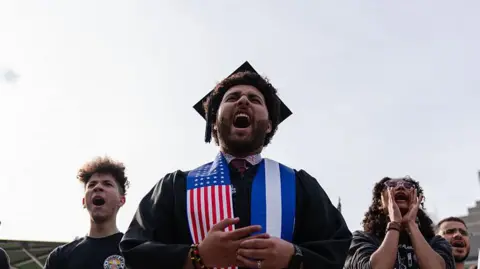In a significant policy shift, the Trump administration has suspended the scheduling of student visa appointments across U.S. embassies, as outlined in a recent directive from Secretary of State Marco Rubio. This new guideline comes amid a backdrop of heightened scrutiny around foreign students and aims to broaden the vetting process, specifically concerning social media activity. The directive mandates embassies and consulates to halt any upcoming appointments related to student visas, although previously scheduled meetings can proceed as planned.
The memo issued by the Secretary of State emphasizes the implementation of enhanced social media vetting for students and foreign exchange visas. These changes herald a shift in how the U.S. approaches security concerns surrounding international students, with the document indicating that this intensified screening process will have significant implications for the operations of U.S. diplomatic missions. However, details regarding the specific criteria for social media examination have not yet been articulated.
The move comes during a tumultuous period in the relationship between the Trump administration and elite U.S. educational institutions, particularly targeting critiques that suggest many colleges harbor leftist ideologies. The administration has accused several schools of fostering an environment conducive to antisemitism, particularly amidst recent tensions surrounding pro-Palestinian movements on campuses. The stakes are high, as many universities fundamentally rely on foreign students for substantial financial support, given that these individuals often pay substantially higher tuition fees than domestic counterparts.
In the wake of this decision, the state department’s spokesperson, Tammy Bruce, asserted that the United States remains committed to methodically vetting individuals seeking entrance into the country. This announcement, publicly shared in a press briefing shortly after the directive, underscores the administration’s prioritization of national security within the immigration framework.
Additionally, the freeze on student visa appointments may adversely affect numerous institutions that often depend on the revenue generated from international students. Statistics indicate that a significant portion of the student population at schools like Harvard University are foreigners, further complicating financial projections for these institutions if foreign enrollment becomes restricted. Earlier this week, demonstrations unfolded at Harvard, where students expressed solidarity with their international peers and articulated concerns regarding the administration’s policies.
Compounding these issues, the Trump administration’s broader strategy has involved cutting substantial funding to universities, with an estimated $100 million specifically targeted at Harvard due to claims of the institution facilitating an environment of extremism and antisemitism. Lawsuits have emerged challenging these actions, underscoring the contentious atmosphere surrounding student visas and immigration policies.
The intensified scrutiny of the international student population aligns with the administration’s overarching stance that college campuses ought to foster civic responsibilities and align more closely with national values. Critics argue that such policies reflect a dangerous precedent that erodes academic freedom and free speech rights within educational environments.
As preparations proceed for this new stage of social media scrutiny and visa application processing, institutions will likely be grappling with the implications of these directives — both in terms of their immediate operational processes and long-term financial viability.
Overall, the recent pause on student visa scheduling not only reflects regulatory shifts but also highlights the intricate interplay between immigration policy and its ramifications for both U.S. educational institutions and the diverse tapestry of international students seeking to benefit from American higher education.



